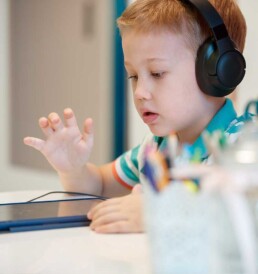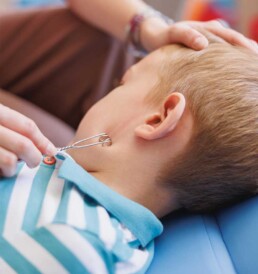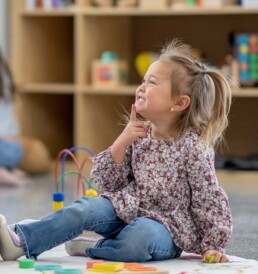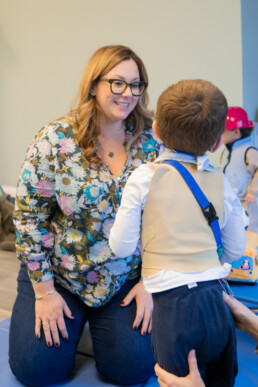While child development follows a sequential pattern, we recognize and celebrate the uniqueness of each child. We understand that the process of achieving developmental goals can vary based on factors such as personality, family dynamics, and medical needs. In all our treatments, we prioritize movement and environmental exploration (through play!) as crucial elements for enriching a child’s development.
Our primary objectives include establishing effective communication, promoting sustainable nutritional habits, fostering age-appropriate independence, developing transitional skills, and providing safe play experiences that contribute to your child’s overall development.
Our specialized team of speech-language pathologists and therapists offer the following services to treat infants, children and adolescents.

Articulation & Phonology
We address articulation (producing specific speech sounds) and phonology (understanding and using sound patterns) to improve clarity and confidence in speech.
Seeing the signs?
- Does your child have trouble being understood by others?
- Are certain sounds (like “r” or “s”) hard to say?
- Do they get frustrated when people can’t understand them?

Assistive Technology
Our specialists guide families in selecting and using assistive technology, including augmentative and alternative communication (AAC) devices, to help children express themselves effectively.
Seeing the signs?
- Does your child struggle to communicate their needs?
- Would they benefit from extra tools to help them “find their voice”?
- Do you wonder if an AAC device could make life easier?

Auditory Processing
We provide intervention for auditory processing difficulties — challenges with understanding and interpreting sounds despite normal hearing — to strengthen listening, comprehension, and learning skills.
Seeing the signs?
- Does your child say “What?” often, even with normal hearing?
- Do they struggle to follow directions in noisy places?
- Is it hard for them to understand spoken information in class?

Expressive & Receptive Language
We work with children to build expressive language skills (how they share ideas) and receptive language skills (how they understand what is said), supporting effective communication.
Seeing the signs?
- Does your child have trouble explaining their thoughts?
- Do they struggle to follow conversations or stories?
- Are new words or directions harder to pick up than expected?

Feeding & Swallowing
We help children overcome challenges with chewing, swallowing, or transitioning between food textures, using safe, evidence-based approaches that make mealtimes more successful.
Seeing the signs?
- Is your child picky beyond the usual picky eating?
- Do they cough, gag, or choke when eating or drinking?
- Do transitions to new textures cause mealtime stress?

Individual Education Evaluation (IEE)
Our clinicians conduct independent education evaluations (IEEs) — comprehensive assessments of a child’s communication abilities — to support tailored educational planning.
Seeing the signs?
- Are you unsure if your child’s school plan meets their needs?
- Do you feel their communication challenges aren’t fully understood?
- Would an independent evaluation give you clearer answers?

Motor Planning & Programming (Apraxia)
We deliver targeted therapy for motor planning and programming difficulties, such as childhood apraxia of speech — a motor speech disorder where the brain has trouble coordinating the movements needed for clear, consistent speech.
Seeing the signs?
- Does your child know what to say but can’t get the words out?
- Are speech sounds inconsistent from one attempt to the next?
- Do they seem to “work hard” just to get words out?

Parent Coaching & Education
We partner with caregivers through coaching and education, offering practical strategies to support speech, language, and feeding development in daily routines.
Seeing the signs?
- Do you want practical strategies you can use every day?
- Are you unsure how best to support your child’s speech or feeding?
- Would step-by-step guidance help you feel more confident?

Tethered Oral Tissues (Tongue Ties)
Our team provides skilled evaluation and treatment for tethered oral tissues, such as tongue ties, which can restrict tongue movement and affect feeding, speech, and oral motor skills.
Seeing the signs?
- Does your baby struggle to latch or feed well?
- Is your child’s tongue movement limited?
- Could a tongue tie be affecting speech or oral motor skills?

Direct Treatment
This includes evaluation and next step recommendations for your child which can include ongoing services or recommendations. This is proved in your home, our office, or virtually based on needs and availability.
Screening
Taking place over multiple days these evaluations provide a deeper look or utilize advanced evaluations when assessing your child’s needs. These may take place across a variety of environments.
Home Planning
An informal observation of your child by a professional who will provide recommendations for further evaluation, beneficial activities, or resources. Often used as a second opinion or when parents aren’t sure if a child needs services.
Specialty Evaluations
Scheduled conversations with parents to help support specific struggles such as feeding, transitions, sleep, or routines. This is can be in addition or an alternative to direct treatment.
Parent Supports
A therapeutic plan or routine is developed based on a child and their family’s needs to meet a specific goal either within the home, school, or another environment.
Team Collaboration
Scheduled conversations with team members of active patients which occur on a regular basis.